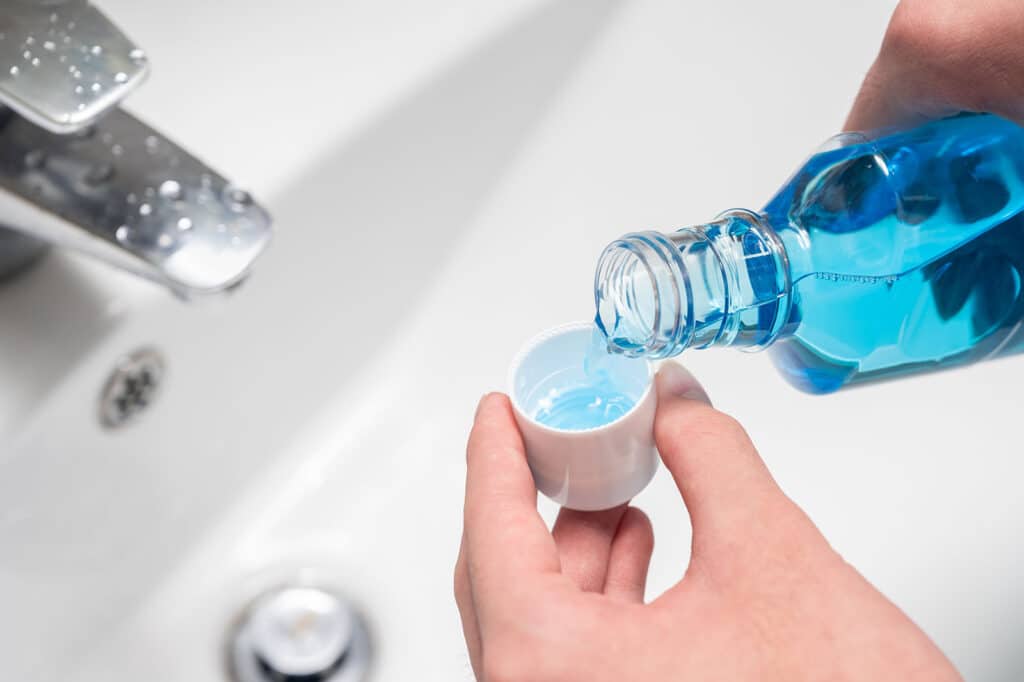Mouthwash is a common part of many oral hygiene routines, used to freshen breath, fight plaque, and prevent gum disease. But what happens if you swallow mouthwash? Is it dangerous? The answer depends on several factors, including the amount swallowed, the type of mouthwash, and the individual’s health. While a small amount of mouthwash is unlikely to cause serious harm, swallowing large quantities can lead to significant health problems.
Table of Contents
What Happens if You Swallow Mouthwash?
Swallowing a small amount of mouthwash, like what might happen accidentally while swishing, is usually not cause for alarm. However, drinking mouthwash, especially in large amounts or frequently, can have serious consequences. The active ingredients in mouthwash, including alcohol (ethanol or ethyl alcohol), fluoride, essential oils (like menthol, eucalyptol, and methyl salicylate), cetylpyridinium chloride, chlorhexidine gluconate, and hydrogen peroxide, can cause various side effects.
TL;DR
- Swallowing more than 3–4 ounces (90–120 mL) of mouthwash can be dangerous, especially if it contains alcohol or other toxic ingredients like fluoride or chlorhexidine.
- In children, as little as 1–2 ounces (30–60 mL) can cause poisoning.
- Large amounts may lead to dizziness, nausea, vomiting, low blood sugar, or alcohol poisoning. If swallowed in significant amounts, seek medical help immediately.
The Dangers of Swallowing Large Amounts of Mouthwash
The primary concern with swallowing large quantities of mouthwash is often the alcohol content. Many mouthwashes contain ethanol, the same type of alcohol found in alcoholic beverages. Consuming large quantities of mouthwash can lead to alcohol intoxication, with symptoms like drowsiness, dizziness, slurred speech, difficulty breathing, decreased heart rate, abdominal pain, and even loss of consciousness. This is particularly dangerous for children, who are more susceptible to the effects of alcohol.
Other active ingredients can also contribute to adverse reactions. Fluoride, while beneficial in small amounts for oral health and preventing tooth decay, can be toxic in large doses, leading to nausea, vomiting, and more severe symptoms. Essential oils, while generally safe for oral use, can cause irritation and other side effects if ingested in large amounts. Certain antiseptic ingredients like chlorhexidine gluconate can also cause adverse reactions if ingested.
Types of Mouthwash and Their Potential Dangers
Different types of mouthwash contain different active ingredients. Alcohol-free mouthwashes are available and may be a better option for children and individuals who wish to avoid alcohol consumption. It’s crucial to read the label and understand the specific ingredients in your mouth rinse. Products with high alcohol content pose a greater risk if ingested in large quantities.

When to Seek Help: Poison Control and Emergency Care
If you or someone you know has swallowed a large amount of mouthwash, contact your local poison control center immediately. They are a valuable resource and can provide expert guidance. You can reach the Poison Control Center at a readily available number. If someone is experiencing severe symptoms, such as difficulty breathing, loss of consciousness, or seizures, seek emergency medical attention by calling 911 or going to the nearest emergency room.
Preventing Mouthwash Overdose
- Accessibility: Keep mouthwash out of reach of children.
- Supervision: Supervise children when they are using mouthwash.
- Read Labels: Always read and follow the instructions on the mouthwash label. Pay attention to the alcohol content and other active ingredients.
- Proper Use: Use mouthwash only as directed. Do not swallow it. Swish for the recommended amount of time and then spit it out.
- Alternatives: Consider using an alcohol-free mouthwash, especially for children.
Maintaining Oral Health
Mouthwash is just one component of good oral hygiene. Brushing your teeth twice a day with fluoride toothpaste, flossing daily, and regular dental checkups are essential for maintaining oral health and preventing bad breath, gum disease (gingivitis), and tooth decay. Consult with your dentist or healthcare provider for personalized advice on oral hygiene practices. The American Dental Association (ADA) provides valuable resources on oral health.
Disclaimer: This article provides general information and does not constitute medical advice. Always consult with a healthcare provider or qualified medical professional for any health concerns or before making any decisions related to your health or treatment. If you suspect a mouthwash overdose, contact poison control or seek emergency medical attention immediately.


